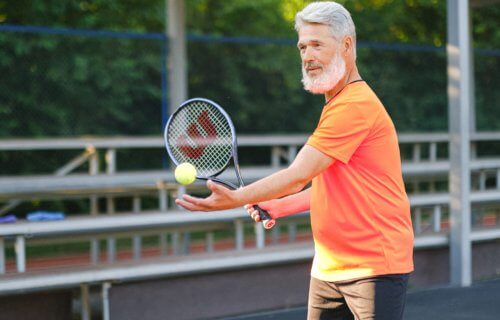TOKYO, Japan — Playing golf or tennis during middle age may seem like just another leisure time activity, but a new study finds it’s also doing a great job of keeping players’ minds healthy. Researchers in Japan have found that men who exercise, or participate in sports like golf and tennis, have a significantly lower risk of developing dementia.
Results show those who got plenty of exercise were 25 percent less likely to develop the disease. However, researchers also point out that the social aspects of these games are also important. The team says these activities have a similar effect to simple household chores like cleaning and cooking.
The findings come from a review of almost 44,000 adults between 40 and 69 years-old in Japan, tracked for around 10 years on average. Study authors compared cases of dementia requiring long-term care with levels of moderate to vigorous physical activity (MVPA).
“Leisure activities that include cognitive activity have a protective association against cognitive decline and dementia,” writes corresponding author Dr. Norie Sawada of Tokyo’s National Cancer Centre and the team in the journal JAMA Network Open.
“A randomized clinical trial reported that combined cognitive and exercise training could improve the cognitive functions of community-dwelling older adults,” the researchers continue. “In addition, the social activity that accompanies leisure-time physical activities, such as participation in golf competitions and enrollment in tennis circles, also has a protective association against cognitive decline and dementia.”
“The men in this study might therefore have been subject to different protective associations against disabling dementia through habitual leisure-time MVPA involving cognitive activity and social activity compared with men with less leisure-time MVPA.”
How do women achieve similar benefits?
The team notes that women in the study may have seen fewer benefits of hitting the golf course or tennis court because they already received a cognitive boost from performing more housework than men typically do in many societies.
“In contrast, this association of leisure-time MVPA may have been attenuated in women participants because women already engage in many cognitive activities through daily housework activities, and are likely to have a larger social network than men,” the researchers write.
Worldwide, estimates show the number of people with dementia will triple to more than 150 million within the next three decades. With no cure in sight, there is an increasing focus on protective lifestyle measures. These new findings reveal that active middle-aged men can slash their risk by a quarter in comparison to their sedentary neighbors.
“The findings suggest that a high level of leisure-time MVPA was associated with decreased risk of disabling dementia in men,” researchers report.
The World Health Organization lists dementia as a public health priority. Recent studies have focused on creating new treatments which boost protection against Alzheimer’s by lowering the levels of inflammation in the brain.
In terms of what older adults can do in their own communities, health experts recommend adults engage in at least 150 minutes of moderate or 75 of vigorous exercise every week. They should also reduce time spent sitting or lying down and break up long periods of immobility with some activity.
“Physical activity is a potential preventive factor for dementia and has been shown to have an inverse association with dementia incidence in several epidemiological studies,” Sawada’s team concludes.
South West News Service writer Mark Waghorn contributed to this report.


OK, so, this new finding says that exercise is healthy.
GOT IT!
Wow, who would have thought?